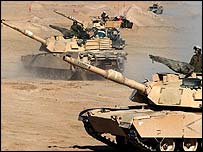
The US has deployed more than 200,000 troops
|
Служба новостей BBC News Online анализирует события, предшествующие войне в Ираке.
30 января 2002:
В своем послании "State of the Union", Президент
Джордж У. Буш для характеристики врагов Америки использовал
выражение "ось зла" ("axis of evil"). Он особо отметил Северную Корею,
Иран и Ирак с их "террористическими союзниками".
Эта речь стала отправным пунктом долгой политической и
дипломатической кампании, возглавляемой американскими "ястребами",
среди которых Дональд Рамсфельд, в пользу войны в Ираке.
6 February:
For the first time a senior member of the current US administration
uses the phrase "regime change" in relation to Iraq. Secretary of State
Colin Powell uses the phrase in front of the House of Representative
International Relations Committee. "Regime change is something the
United States might have to do alone," he said.
12 September:
A day after the first anniversary of the 11 September attacks, Mr Bush
tells the United Nations General Assembly that Iraq is a "grave and
gathering danger" and that the US "will not allow any terrorist or
tyrant to threaten civilisation with weapons of mass murder".
He said Washington wanted to work through the UN Security Council - but
warned that military action would be unavoidable if Iraq failed to
comply with UN resolutions.
17 October:
The US Senate gives final approval to the biggest increase of military
spending in two decades, approving spending of $355.1bn on the military
- an increase of $37.5bn from the previous year.
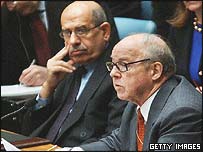
The weapons inspectors trod a thin line between those wanting a war and those opposing it
|
The vote follows President Bush's signing of the
Congressional resolution to authorise the use of force against Iraqi
leader Saddam Hussein over his alleged weapons of mass destruction.
8 November:
After weeks of wrangling, the UN Security Council passes resolution
1441 designed to force Iraq to give up all weapons of mass destruction
and threatening "serious consequences" if it does not comply. Iraq
accepts the terms of the resolution.
27 November:
United Nations weapons inspectors completed their first field visit in Iraq for four years.
7 December:
Baghdad hands over to the UN a 12,000-page document on what it says is
a current and complete declaration of all of its chemical, biological,
nuclear and missile programmes. In the declaration, Iraq denies having
any nuclear, chemical or biological weapons.
19 December:
The US declares Iraq in "material breach" of resolution 1441 because
Washington believes Baghdad's declaration of its weapons programmes is
incomplete.
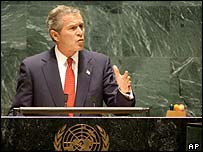
Bush tried to work through the UN
|
Chief UN weapons inspector Hans Blix provides an
initial briefing to the Security Council on Iraq's declaration. He says
some of Iraq's proscribed weapons are still unaccounted for, but also
asks the US and Britain to provide to the UN intelligence they say they
have that proves Iraq still has weapons of mass destruction.
9 January 2003:
Mr Blix tells the Security Council that there are still "many
unanswered questions" about Iraq's weapons programmes but that
inspectors have not "found any smoking guns" that might trigger war.
20 January:
UK Defence Secretary Geoff Hoon announces the deployment of 26,000 British troops in the Gulf region.
27 January:
UN inspectors present key evidence to the Security Council about their
search for weapons of mass destruction in Iraq and Iraqi co-operation
with resolution 1441. The report is unexpectedly negative. Mr Blix
says: "Iraq appears not to have come to a genuine acceptance - not even
today - of disarmament."
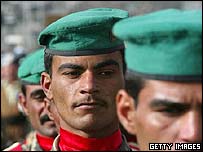
All along Iraq has denied that it has weapons of mass destruction
|
The report is seized on by the US and UK as proof that
Iraq is not disarming, while other states argue that the inspectors
need to be given more time.
28 January:
President Bush delivers a State of the Union address in which he
promises to present fresh evidence about Iraq's weapons programmes and
vows to lead a military campaign if the Iraqis do not disarm.
6 February:
Colin Powell briefs the Security Council on what the US sees as Iraq's
non-compliance with UN resolutions and links to al-Qaeda.
He says the UN must act to prevent Iraq's "active and systematic
efforts" to hide its efforts to produce weapons of mass destruction. He
presents tape recordings, satellite photographs and intelligence data
showing Baghdad's "evasion and deception" in the face of UN weapons
inspections.
Other members of the Security Council are unconvinced and call for weapons inspections to be strengthened and given more time.
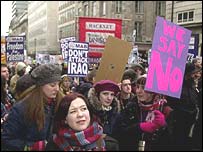
In February 2003 there were massive anti-war demonstrations across the world
|
14 February:
Hans Blix delivers a report to the Security Council on Iraqi
co-operation with weapons inspections. His assessment is upbeat, though
he criticises Iraq for failing to account for specific armaments and
materials. He pointedly questions certain conclusions that US
intelligence had come to in Colin Powell's briefing eight days earlier.
The general tenor of the report is that the weapons inspectors believe
it is worth continuing with their work. The briefing is widely seen as
giving some ammunition to the insistence of France, Russia and China
that inspections continue.
15 February:
Pentagon officials confirm 150,000 United States military personnel are
now in and around the Gulf as part of the build-up for a possible war
with Iraq. Half that number are in Kuwait alone and more troops are
expected to arrive soon.
There are massive anti-war protests across the world. In London, an
estimated one million people come out onto the streets. There are
marches in the US, Australia and in some European and Middle Eastern
cities.
24 February:
The US, UK and Spain submit a new draft resolution on Iraq. The text
refers to the warning in Resolution 1441 that Iraq faces "serious
consequences" if it does not fully co-operate. It accuses Iraq of
"failing to comply" with the terms of Resolution 1441, pointing in
particular to "false statements" and "omissions" in its weapons
declarations.
France, Germany and Russia submit a rival proposal to the
Council to intensify weapons inspections in Iraq as an alternative to
military action.
26 February:
UK Prime Minister Tony Blair suffers a serious parliamentary rebellion
over his handling of the Iraq crisis when 122 members of the ruling
Labour Party vote against their leader. Mr Blair wins majority
parliamentary backing but it is increasingly clear that he is taking a
big political risk in backing the United States.
1 March:
Iraq begins destroying its al-Samoud medium-range missiles. The
missiles are found to be in breach of UN resolutions, exceeding the
permitted range of 150km by 33km. Hans Blix describes the move as "very
significant".
7 March:
Hans Blix tells the UN Security Council that it will
take several months to check whether Iraq has complied fully with its
disarmament obligations. Mr Blix says inspectors have been able to
conduct operations throughout Iraq with relative ease and described the
ongoing destruction of al-Samoud II missiles as a "substantial measure
of disarmament".
10 March:
France and Russia announce that they are ready to veto a new UN
resolution which gives Iraq seven days to disarm. French President
Jacques Chirac says his country would vote against any resolution that
contained an ultimatum leading to war until the weapons inspectors in
Iraq said they could do no more.
11 March:
US Defence Secretary Donald Rumsfeld says that the US
might go to war against Iraq without the UK - reflecting, analysts say,
tension between Washington and London over how much further time to
give diplomacy.
16 March:
President Bush, Mr Blair and the Spanish Premier Jose Maria Aznar
meet in the Azores. They set a deadline of the end of Monday 17 March
for the Security Council to back the US/UK resolution demanding
immediate Iraqi disarmament. Mr Bush called it a "moment of truth for
the world".
17 March:
The US, UK and Spain withdraw plans for a new Security Council resolution, ending their attempts to win UN backing for war.
The British ambassador to the UN, Sir Jeremy Greenstock, blames
France - without naming it - for threatening to use its veto. The
French ambassador to the UN, Jean-Marc de La Sabliere, says that in
last-minute negotiations with the 15 members of the Security Council
"the majority of the council confirmed they do not want a use of
force".
President Bush later delivers a live television address that sets the clock ticking to war.
"Saddam Hussein and his sons must leave Iraq within 48 hours. Their
refusal to do so will result in military conflict, commenced at the
time of our choosing," Mr Bush says.
18 March:
In one of the most important speeches of his career,
Mr Blair makes the case for war to the House of Commons, saying: "I
believe passionately we must hold firm to that course [of disarmament
of Iraq]".
The prime minister later wins Commons backing to send UK forces into
battle in Iraq, but suffers a major Labour backbench rebellion.
20 March:
Explosions are heard in Baghdad, 90 minutes after
President Bush's deadline for Saddam Hussein to go into exile or face
war expires.
Shortly after, presidential spokesman Ari Fleischer says: "The opening
stages of the disarmament of the Iraqi regime have begun."
President Bush makes a live TV address at 0315 GMT (2215 local time).
He tells the nation: "On my orders, coalition forces have begun
striking selected targets of military importance to undermine Saddam
Hussein's ability to wage war.
"These are opening stages of what will be a broad and concerted campaign."
